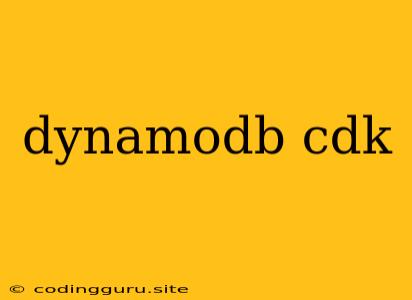Unlocking the Power of DynamoDB with AWS CDK
The world of cloud infrastructure is constantly evolving, and with it, the need for efficient and scalable data storage solutions. Amazon DynamoDB stands as a cornerstone of this landscape, providing a fully managed, NoSQL database service designed for high performance and availability. But how can we effectively integrate DynamoDB into our cloud applications? This is where the AWS CDK (Cloud Development Kit) comes into play, offering a powerful and intuitive way to define and deploy DynamoDB resources using familiar programming languages.
Why Choose CDK for DynamoDB?
Traditionally, managing DynamoDB resources involved navigating the complexities of AWS console configurations or crafting intricate CloudFormation templates. The CDK provides a much more streamlined and developer-friendly approach. It allows you to define your DynamoDB resources using code, offering several key advantages:
- Simplified Infrastructure Definition: No more wrestling with YAML templates or navigating through countless AWS console menus. The CDK allows you to express your DynamoDB setup in a clear and concise manner, directly within your preferred programming language.
- Code Reusability and Collaboration: CDK enables you to define your DynamoDB resources as code, facilitating reusability and collaboration. You can easily share and integrate DynamoDB components across different projects, promoting consistency and reducing the chances of configuration errors.
- Strong Typing and Code Completion: Leveraging the power of your chosen programming language, the CDK offers robust typing and code completion features. This not only improves the development experience but also helps catch potential errors early on in the development cycle.
- Enhanced Infrastructure Testing: CDK enables you to write unit tests for your DynamoDB infrastructure code, ensuring that your deployment adheres to your intended design and functionality.
Building Your First DynamoDB Resource with CDK
Let's dive into a simple example showcasing the ease of creating a DynamoDB table using CDK. We'll use the TypeScript language, but the core principles remain the same for other supported languages like Python and Java.
import * as cdk from 'aws-cdk-lib';
import { Construct } from 'constructs';
import * as dynamodb from 'aws-cdk-lib/aws-dynamodb';
export class MyStack extends cdk.Stack {
constructor(scope: Construct, id: string, props?: cdk.StackProps) {
super(scope, id, props);
// Create a DynamoDB table
new dynamodb.Table(this, 'MyDynamoDBTable', {
partitionKey: { name: 'primaryKey', type: dynamodb.AttributeType.STRING },
billingMode: dynamodb.BillingMode.PAY_PER_REQUEST,
});
}
}
In this code, we define a DynamoDB table named 'MyDynamoDBTable' with a partition key named 'primaryKey' of type String. We also specify the billing mode as 'PAY_PER_REQUEST', allowing you to pay only for the resources you use.
Going Beyond the Basics: Advanced DynamoDB Features with CDK
The CDK provides a comprehensive set of constructs for managing all aspects of your DynamoDB deployment. This includes:
- Secondary Indexes: Effortlessly create global secondary indexes (GSIs) for efficient queries on your DynamoDB tables.
- Stream Processing: Tap into the power of DynamoDB streams to receive real-time updates about changes to your data, enabling integration with other AWS services.
- Point-in-Time Recovery: Implement robust disaster recovery strategies by enabling point-in-time recovery for your DynamoDB tables.
- Access Control: Define granular access policies for your DynamoDB resources using IAM roles and policies.
Real-World DynamoDB Use Cases with CDK
The CDK's flexibility empowers you to tackle a wide array of DynamoDB use cases:
- eCommerce Applications: Store product data, user profiles, and order information with high throughput and scalability.
- Gaming Platforms: Handle player statistics, game state, and leaderboards efficiently with DynamoDB's ability to handle high-volume data.
- Social Media Platforms: Manage user posts, comments, and relationships, leveraging DynamoDB's flexibility and scalability.
Conclusion
Adopting the CDK for your DynamoDB needs provides a powerful and efficient way to manage your database infrastructure. The ability to define resources as code, along with the comprehensive set of constructs for advanced features, makes CDK an indispensable tool for modern cloud developers. Whether you're building a simple application or a complex, data-intensive system, the CDK empowers you to unleash the full potential of DynamoDB in your cloud applications.
